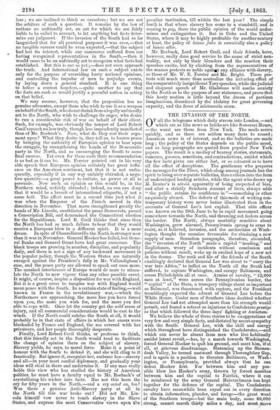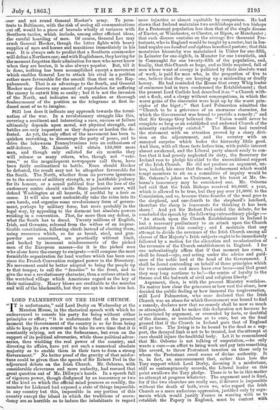THE INVASION OF THE NORTH. tv all the telegrams which
daily stream into London, —and which are as like news as bricks are like Somerset House, —the worst are those from New York. The mails arrive quickly, and so there are seldom many facts to record ; American news is of interest, and so the bulletins are made long ; the policy of the States depends on the public mood, and so long paragraphs are quoted from popular New York papers. The result is a medley of hearsay stories, statements, rumours, guesses, assertions, and contradictions, amidst which the few facts given are either lost, or so coloured as to have all the effect of deceptions. The gentleman who prepares the messages for the Times, which alonp among journals has the spirit to bring over separate bulletins, throws them into the form of undeveloped leading articles, while the agent who draws up H. Reuter's is afraid apparently of being suspected of bias, and after a strictly Southern account of facts, always adds "the public retains its confidence in "—something or other exquisitely absurd. The defects of this mode of writing con- temporary history were never better illustrated than in the accounts of General Lee's last exploit. That able officer was known on the 20th June to be in rapid movement going somewhere towards the North, and throwing out feelers across the border. The North, always morbidly sensitive about Washington, grew alarmed, Pennsylvania sprang to arms to resist, as it believed, invasion, and the authorities at Wash- ington thought the occasion favourable for obtaining a new supply of men. Sensation paragraphs, therefore, abounded, the "invasion of the North" made a capital "heading," and Englishmen, weary of incidents without conclusion and. policies without result, woke up in excited hope of a new act in the drama. The rank and file of the friends of the South exultingly declared that General Lee was about to "carry the war into Africa," to -inflict on the North all the South had suffered, to capture Washington' and occupy Baltimore, and assess Philadelphia all at once. Armies of cavalry, "12,000 men at least," were across the Pennsylvanian border, the " capital " of the State, a trumpery village about as important as Balmoral, was threatened with capture, and the President tremblingly expected the advent of General Lee before the White House. Cooler men of Southern ideas doubted whether General Lee had not attempted more than his strength would permit, and feared a retreat as injurious to Confederatepregige as that which followed the three days' fighting at Antietam.
We believe the whole of these stories to be exaggerations of very few and very simple facts, and dictated by secret sympathy with the South. General Lee, with the skill and energy which throughout have distinguished the Confederates,—and which can never be absent from men who live habitually amidst latent revolt,—has, by a march towards Washington, forced General Hooker to quit his ground, and meet him, if at all, at grievous disadvantage. Streaming up the Shenan- doah Valley, he turned eastward through Thoroughfare Gap, and is again in a position to threaten Baltimore, or Wash- ington, or Pennsylvania, provided always that he can defeat Hooker first. For between him and any pos- sible blow lies Hooker's army, thrown by forced marches between him and the capital to Fairfax, where it can be reinforced by the army General Heintzelmann has kept together for the defence of the capital. The Confederate cavalry have meanwhile been rayed out in every direction to obtain information, plunder, and forage—the great want of the Southern troops—but the main body, some 80,000 strong, cannot march thirty miles a day, and must. wove over and not round General Hooker's army. To pene- trate to Baltimore, with the risk of seeing all communications cut off, would be a piece of bravado wholly at variance with Southern tactics, which include, among other efficient ideas, the careful hoarding of men. Of course, General Lee may crush General Hooker, though the latter fights with heavy supplies of men and horses and munitions immediately in his rear. It is always safe to predict that a Southern commander will defeat a Northern one; and with Englishmen, they having for the moment forgotten their admiration for men who never know when they are beaten, it is also always popular. But, till it is done, nothing has been accomplished except a movement which enables General Lee to attack his rival in a position rather more favourable for the assault than that on the Rap- pahannock. That is an advantage to the South, and General Hooker may deserve any amount of reprobation for suffering the enemy to outwit him so easily; but it is not the invasion of the North, and indicates no such sudden or thorough houleversenzent of the position as the telegrams at first in- duced most of us to imagine.
Still less does it indicate any approach towards the termi- nation of the war. In a revolutionary struggle like this, covering a continent and interesting a race, success or failure ultimately depends upon moral, not physical strength, and battles are only important as they depress or harden the de- feated. As yet, the only effect of the movement has been to quicken recruiting, to discourage the party of peace, and to drive the lukewarm Pennsylvanians into an enthusiasm of self-defence. Mr. Lincoln will obtain 150,000 more men, and though only enlisted for six months they will release as many others, who, though not "vete- rans," as the magniloquent newspapers call them, have been fairly acclimatized to battle. Even should Hooker be defeated, the result may not be altogether favourable for the South. The North, whether from its perverse ignorance as to the sources of military strength, or a justifiable jealousy for its honour, or a sound political fear lest the loss of the customary centre should excite State jealousies anew, will defend Washington at all hazards, if needful by a levee en mane. It will also most undoubtedly take the reins into its -own hands, and organize some revolutionary form of govern- ment, perhaps by military force, but more probably in the legal way, by appealing to the dormant but absolute powers residing in a convention. That, far more than any defeat, is what the South has to dread. Twenty millions of English, Irish, and Germans, released from the withes of an imprac- ticable constitution, following chiefs instead of electing them, using resources which, so far as bread, steel, and gun- powder are concerned, are practically without limit, and backed by incessant reinforcements of the picked men of the European masses—for it is the picked men -who alone have the energy to emigrate—will compose the most formidable organization for land warfare which has been seen since the French Convention resigned power to the Directory. No movement could be better adapted to bring the people up to that temper, to call the "fanatics" to the front, and to give the war a revolutionary character, than a serious attack on the wretched village .which Americans regard as the key of their nationality. Heavy blows are creditable to the muscles and will of the blacksmith, but they are apt to make iron hot.































 Previous page
Previous page